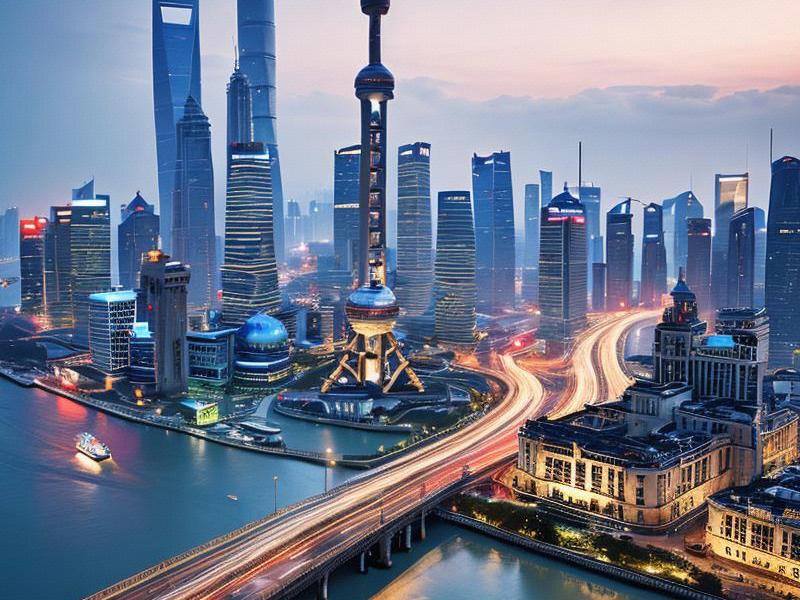
Shanghai, often referred to as the "Pearl of the Orient," stands as a testament to China's rapid urbanization and economic rise. Over the past few decades, this vibrant city has undergone a remarkable transformation, emerging as one of the most dynamic and influential global cities. Its skyline, a blend of historic architecture and futuristic skyscrapers, symbolizes the harmonious coexistence of tradition and modernity.
The story of Shanghai's transformation is deeply intertwined with China's economic reforms and opening-up policies initiated in the late 20th century. In 1990, the Chinese government established the Shanghai Pudong New Area, a strategic move to revitalize the city's economy and position it as a global financial hub. This initiative marked the beginning of a new era for Shanghai, characterized by rapid urban development, infrastructure expansion, and the influx of foreign investments.
One of the most striking aspects of Shanghai's transformation is its skyline, which has been reshaped by iconic landmarks such as the Oriental Pearl Tower, the Jin Mao Tower, and the Shanghai Tower. These structures not only serve as symbols of the city's economic prowess but also attract millions of tourists from around the world each year. The Bund, a historic waterfront area, has also undergone a remarkable facelift, with new developments and attractions that blend seamlessly with its colonial-era architecture.
Economically, Shanghai has become a powerhouse, driving China's export-driven economy and serving as a gateway for international trade. The city is home to the Shanghai Stock Exchange, one of the largest stock exchanges in Asia, and hosts numerous multinational corporations and financial institutions. Its free trade zone, established in 2013, has further solidified its status as a global business hub, offering tax incentives and streamlined regulations to attract foreign investment.
爱上海同城对对碰交友论坛 Beyond its economic achievements, Shanghai has also made significant strides in cultural and technological advancements. The city is a melting pot of cultures, with a rich history of art, music, and cuisine. The Shanghai Museum, one of the largest and most prestigious museums in China, houses an impressive collection of ancient Chinese art and artifacts. The city's vibrant arts scene, including theaters, galleries, and music festivals, reflects its commitment to preserving and promoting cultural heritage.
Technologically, Shanghai is at the forefront of innovation, with a strong focus on research and development. The city has established itself as a hub for high-tech industries, including information technology, biotechnology, and green energy. The Zhangjiang Hi-Tech Park, often referred to as "China's Silicon Valley," is home to numerous startups and research institutions, fostering a culture of entrepreneurship and innovation.
Shanghai's transformation is not without its challenges. As the city continues to grow, it faces issues such as urban sprawl, environmental degradation, and social inequality. However, the government has implemented various initiatives to address these challenges, including sustainable urban planning, green infrastructure projects, and social welfare programs. The city's commitment to sustainability is evident in its efforts to reduce carbon emissions, promote renewable energy, and enhance public transportation systems.
One of the most ambitious projects in this regard is the Maglev train, which connects Shanghai Pudong International Airport to the city center at an incredible speed of 430 kilometers per hour. This cutting-edge transportation system not only reduces travel time but also exemplifies Shanghai's dedication to innovation and environmental consciousness.
爱上海419论坛 Culturally, Shanghai has embraced its role as a global city, hosting international events and festivals that showcase its diversity and openness. The Shanghai International Film Festival, one of the oldest and most prestigious film festivals in Asia, attracts filmmakers and audiences from around the world. The city's vibrant nightlife, with its mix of traditional tea houses and modern bars, reflects its cosmopolitan character and appeal.
Education is another area where Shanghai has made significant strides. The city is home to some of the best universities in China, including Fudan University and Tongji University, which are renowned for their academic excellence and research contributions. Shanghai's education system emphasizes innovation and critical thinking, preparing its students to meet the challenges of a rapidly changing world.
Tourism is a major contributor to Shanghai's economy, with millions of visitors drawn to its unique blend of history, culture, and modernity. The city's attractions range from historical sites such as the Yu Garden and the former French Concession to modern landmarks like the Shanghai Tower and the World Financial Center. The Huangpu River cruises offer a glimpse into the city's past and present, providing a memorable experience for tourists.
上海龙凤论坛419 Shanghai's transformation has also had a profound impact on its residents, who enjoy a high standard of living and access to world-class amenities. The city's healthcare system is among the best in China, with numerous hospitals and clinics offering advanced medical services. Public transportation is efficient and convenient, with an extensive network of buses, subways, and taxis.
However, the rapid pace of development has also brought about social and environmental challenges. The city has implemented various measures to address these issues, including urban renewal projects, green spaces, and environmental regulations. The government is committed to creating a sustainable and livable city for its residents, balancing economic growth with environmental protection and social equity.
In conclusion, Shanghai's transformation is a remarkable story of resilience, innovation, and ambition. From a modest port town to a global metropolis, the city has embraced change and emerged as a symbol of China's rise on the world stage. Its journey serves as an inspiration for other cities around the world, demonstrating the potential of urbanization and economic development to drive progress and improve lives.
As Shanghai continues to evolve, it remains a beacon of modernity and a hub of opportunity, attracting people from all over the world who seek to experience its unique blend of tradition and innovation. The city's future is bright, with endless possibilities for growth and development in the years to come.
